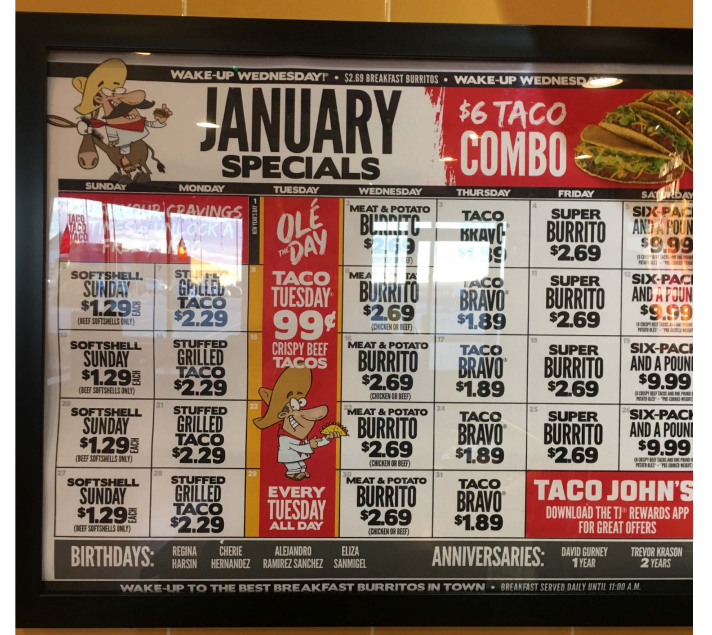Something to Taco-Bout: Taco Bell Takes on TACO TUESDAY Trademark Registrations
Client Alert | 17 min read | 07.21.23
It seems most everyone has been closely monitoring Taco Bell’s cancellation proceedings directed to federal trademark registrations covering the TACO TUESDAY trademark. On July 15, 2023, one of the registrants, Spicy Seasonings, LLC, withdrew its registration after decades of ownership, supporting Taco Bell’s allegations that the phrase is generic and therefore not protectable as a trademark.
At its core, a trademark or service mark is a source identifier. Provided a mark owner makes the requisite use of its mark (and comports with the United States Patent and Trademark Office’s (USPTO) requirements to maintain any federal registration for that mark[1]), its rights in the mark or federal registration are often maintained without issue. However, a mark owner’s rights can be challenged – and its registration cancelled – if certain circumstances are met. These circumstances might include, for example, the “genericide”[2] of a registered mark. Generally, genericide occurs when the consuming public identifies a mark with a specific type or broad category of goods or services rather than the source of these goods or services. Examples of once registered trademarks that fell victim to genericide include THERMOS for vacuum-insulated bottles, ASPIRIN for acetyl salicylic acid, and ESCALATOR for a moving stairway. See, e.g. King-Seeley Thermos Co. v. Aladdin Indus., Inc., 321 F.2d 577 (2d Cir. 1963) (finding “THERMOS” generic because the public did not know the term had trademark significance due in part to the registrant’s advertising campaign’s descriptive use of the term); Bayer Co. v. United Drug Co., 272 F. 505 (S.D.N.Y. 1921) (finding “ASPIRIN” generic because the registrant told manufacturing chemists it was the source of the drug, but failed to properly inform the purchasing public); Haughton Elevator Co. v. Seeberger, 85 U.S.P.Q. 80 (1950) (finding “ESCALATOR” generic because the general public, engineers, and architects understood “ESCALATOR” to mean any moving stairway, not just those made by registrant). In Taco Bell’s two petitions for cancellation, filed on May 16, 2023 against Gregory Hotel and Spicy Seasonings, LLC, Taco Bell alleges “TACO TUESDAY” has similarly become a generic phrase, and no longer serves as a source identifier of restaurant services.
In support of its cancellation actions, Taco Bell argued (sometimes with tongue firmly in cheek) that “TACO TUESDAY” is a commonly used phrase that is “critical to everyone’s Tuesday” and understood by most consumers to refer to a day of the week where they can score discounted taco meals. Taco Bell asserted that because many restaurants run “TACO TUESDAY” “promotions, deals, coupons, and other incentives for purchasing tacos and related products on Tuesdays,” the mark can no longer serve as an indicator of either Gregory Hotel’s or Spicy Seasonings’ restaurant services. And, in fact, promoting Tuesday taco deals is exactly how Gregory Hotel has historically used the mark. See, e.g. Gregory Hotel’s most recent specimen of use, which shows the mark TACO TUESDAY in advertising material detailing daily deals, including taco deals on Tuesdays:

Taco Bell also pointed to survey findings that purportedly determined 86% of survey respondents believed the phrase “TACO TUESDAY” is “a common name not associated with any particular company.”[3] In this respect, it appears that, at least in recent years, the USPTO is inclined to agree; finding “TACO TUESDAY” is not a protectable mark. In In re Monday Night Ventures LLC, the applicant applied to register the mark TACO TUESDAY for beer.[4] In re Monday Night Ventures LLC, Ser. No. 88/817,107, 2022 WL 17730970, at *1 (TTAB, Nov. 28, 2022). The Examining Attorney refused registration of the TACO TUESDAY mark because they believed the mark failed to function as a source identifier, noting the phrase was a “well-recognized, cultural phenomenon where persons consume tacos and beverages, including beer, on Tuesdays.” Id. at *3. The TTAB affirmed the USPTO’s refusal to register the applied-for TACO TUESDAY mark for beer, likewise finding the phrase “TACO TUESDAY” is a “very commonplace term that refers to having tacos and drinks on that particular day of the week.” Id. at *6. Similarly, in September 2019, LeBron James applied to register the mark TACO TUESDAY for various offerings, including advertising and marketing services, podcasting services, and other online entertainment services. Mr. James’ application was refused following the USPTO’s determination that, again, the TACO TUESDAY mark “d[id] not function as a trademark or service mark to indicate the source of the applicant’s goods or services” because it “is a commonplace term, message, or expression widely used by a variety of sources that merely conveys an ordinary, familiar, well-recognized concept or sentiment.” The application was subsequently abandoned.
Both Mr. James and Monday Night Ventures sought registration for the phrase TACO TUESDAY decades after issuance of Gregory Hotel’s and Spicy Seasonings’ TACO TUESDAY registrations, which were granted registration in 2009 and 1989, respectively. The USPTO’s refusal to register the later-filed TACO TUESDAY marks based on their purported genericness serves to highlight how consumer perceptions and understanding of certain names or phrases can impact a mark’s protectability over time. Nevertheless, it seems both Taco Bell and Mr. James took these changed consumer perceptions in stride – respectively producing and staring in the now viral “Taco Bleep” ad campaign,[5] in which Mr. James opines that “everyone should be able to say and celebrate Taco *******.” The ad’s implication is clear: “TACO TUESDAY” has become part of the cultural vernacular and allowing one or two entities to own the phrase for restaurant services is as ludicrous as the ad itself. Spicy Seasonings seems to agree, having now decided to abandon its TACO TUESDAY registration and stating that “we're challenging our litigious competitors and other taco-loving brands to join us in supporting the people who serve our favorite food to guests across the nation.”
Taco Bell contends (again, with tongue in cheek) that it wants everyone to LIVE MÁS® no matter where their favorite taco joint is, claiming “[i]f one of us is not free to celebrate ‘Taco Tuesday,’ then none of us are free to celebrate ‘Taco Tuesday.’” An on brand and cheeky call to action, but also an apt summary of Taco Bell’s position. The phrase “TACO TUESDAY” has become part of the consuming public’s vernacular, a point that appears to be agreed upon by the USPTO, Taco Bell, and now Spicy Seasonings. The phrase is understood as a “custom in many US cities of going out to eat tacos or in some cases select Mexican dishes, typically served in a tortilla, on Tuesday nights.”[6] Hip-hop group, Migos, celebrated the joy that is “Taco Tuesday” in their 2020 song of the same name and Lord Business showered everyone with tacos on “Taco Tuesday” in the LEGO® Movie in 2014. Time will tell whether the TTAB determines the phrase “TACO TUESDAY” has become so commonplace it can no longer identify Gregory Hotel’s restaurant services,[7] but in the meantime, Taco Bell’s challenge to the federal registration of TACO TUESDAY serves as a strong reminder to brand owners to properly use and maintain their marks, especially in the face of evolving language, dialects, and general cultural understanding of certain words and phrases.
With respect to defending against genericide, brand owners have a number of options at hand. Proper trademark use is tantamount. As a standard practice, brands should establish use guidelines for their trademarks. Internally, brand owners should provide, circulate, and continually update guidance on the proper use of their marks in communications, advertising and marketing campaigns, labels, tags, product packaging, and much more. Proper trademark usage should also be emphasized and enforced with vendors, retailers, and all other entities manufacturing or selling their products. Brand owners should also keep records detailing their efforts to promote their branded products, including, for example, records of marketing costs, revenue figures, awards and accolades, and promotional campaigns. Externally, consumer education is important. Brands should make every effort to properly use their mark as a descriptor – not a noun – and encourage the consuming public to do the same. In a fight against genericide, small, consistent efforts to maintain control of a trademark may help keep it out of the common vernacular, thus preserving brand owners’ rights in their intellectual property.
[1] This might include, for example, timely and proper submissions of declarations of continued use, examples of such use, and applications for a registration’s renewal.
[2] A mark becomes generic when “the registered mark has become the generic name of goods or services on or in connection with which it has been used.” 15 U.S.C. § 1064(3). This phenomenon is referred to as “genericide.”
[3] Consumer surveys are common tools in adversarial trademark proceedings. And, with respect to proceedings involving claims of genericness, almost required. E. Deborah Jay, Genericness Surveys in Trademark Disputes: Evolution of Species, 99 Trademark Rep. 1118 (2009). Some judges even view not having a survey to support a position as a sign the litigant is not serious about their position. See Gimix, Inc. v. JS&A Group, Inc., 213 U.S.P.Q. 1005, 1982 WL 52164 (N.D. Ill. 1982), aff’d 699 F.2d 901 (7th Cir. 1983). While surveys can be helpful evidence of consumer perception, the Supreme Court provides a timely caution that data from a survey must be carefully evaluated and weighed by the court. See USPTO v. Booking.com B.V., 140 S.Ct. 2298, 2307, n. 6 (2020).
[4] The applicant’s TACO TUESDAY application included a disclaimer of the term “TUESDAY” apart from the mark as shown.
[5] Taco *Bleep* (Commercial) | Taco Bell - YouTube © Taco Bell
[6] “Taco Tuesday,” https://en.wikipedia.org/wiki/Taco_Tuesday (last visited Jul. 19, 2023).
[7] While Spicy Seasonings, LLC submitted a Notice of Abandonment of their TACO TUESDAY registration on July 18, 2023, Gregory Hotel has indicated it intends to keep on fighting for its rights in the TACO TUESDAY mark.
Contacts
Insights
Client Alert | 3 min read | 03.02.26
Clinical trial sponsors and all other stakeholders involved in conducting commercial clinical trials of investigational medicinal products (IMP) in the UK.
Client Alert | 4 min read | 03.02.26
Client Alert | 3 min read | 02.27.26
Client Alert | 6 min read | 02.27.26




